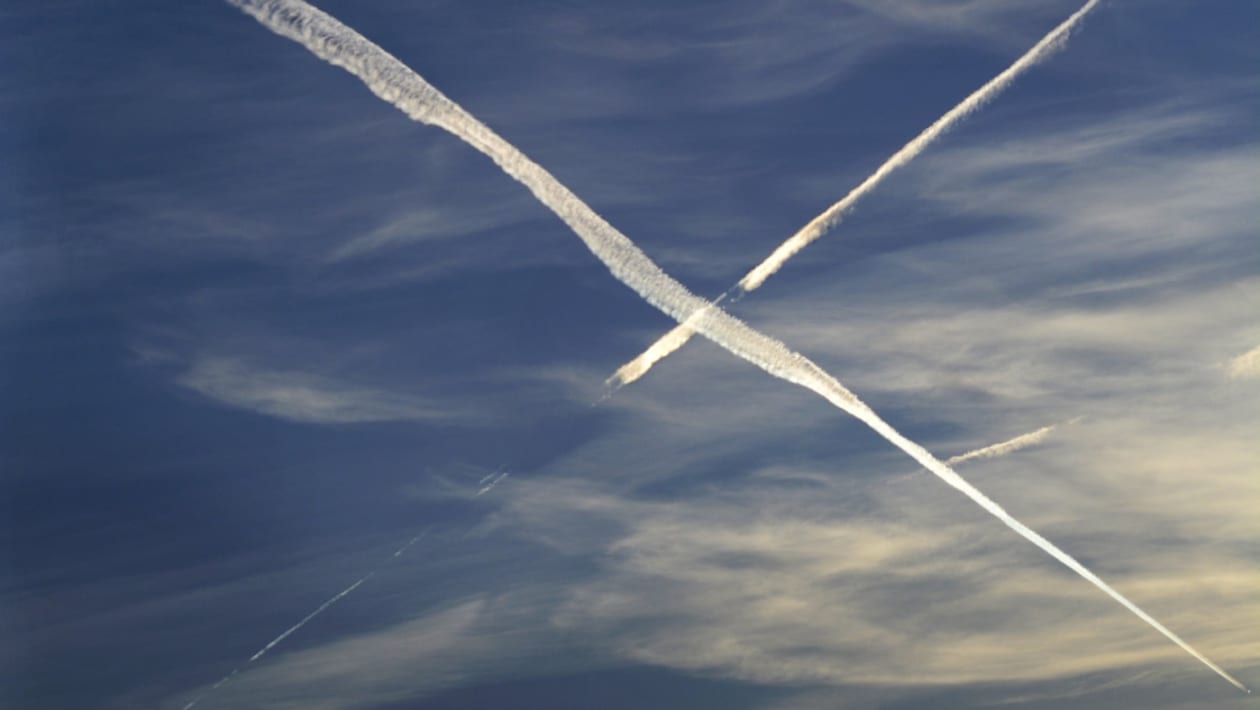What is the chemtrails conspiracy?

In the right weather conditions, long lines of thin clouds trailing planes can be seen in the sky, sometimes long after an aircraft has disappeared from view.
These clouds are contrails, and are the result of water vapour emitted from planes condensing in freezing temperatures, leaving behind “thin trails of ice crystals”, explained the Met Office.
But “ever since the US Air Force published a paper in 1996 about the hypothetical harnessing of weather for military objectives”, a “shadowy global aviation conspiracy” has spread among online communities, said National Geographic.
Theorists’ beliefs
The chemtrail conspiracy theory took root in the 1990s, but in recent years “a significant number of people” have taken to social media to share “speculation, questions and images of contrail cross-hatched skies”, said the BBC.
“Believers” say that the “puffy plumes of water vapour” that trail from planes are “evidence of a secret plot to control weather or poison the environment” by spraying chemicals into the atmosphere, the broadcaster continued.
A common claim is that the emissions from a standard plane should “dissipate quickly so any clouds that do not disappear immediately must be full of additional, undisclosed substances”, said Scientific American.
Depending on theorists’ individual beliefs, “a pick-and-mix selection of the UN, the military, national governments, the Rothschilds, climate scientists, pilots and big business” are claimed to be responsible for chemtrails, said the BBC.
The reasons why a large organisation might be behind this kind of activity span a range of “nefarious purposes from weather modification, to human population control via sterilization, to even mind control”, added Scientific American.
A survey conducted in the US, Canada and UK in 2011 found that “an incredible” 16.6% of respondents subscribed to the theory, said National Geographic. A 2017 paper published in Nature found that percentage could be as high as 40% among the US general population.
Scientific response
Scientists have maintained that there is no evidence of chemical substances being atmospherically spread via planes in order to alter weather patterns, or to poison or control humans.
A common claim made by believers is that chemtrails can be distinguished from normal contrails “because they remain in the sky for longer than they did prior to the mid-90s, and dissipate into cirrus clouds”, said National Geographic.
The Met Office explains, however, that once ice crystals have formed, “what happens next depends on how dry or how humid the air is”.
In dry air, ice crystals will turn from a solid to a gas “and become invisible”, says the weather service. But in humid conditions, the emitted water vapours “will stay where they are, often spreading out, leaving a fluffy trail where the aircraft has passed”.
Trails of ice crystals “may last for many hours, leaving the sky criss-crossed with lines”.
The evidence
A paper published by Environmental Research Letters in 2016 collated 77 experts’ conclusions on evidence of a “secret, large-scale atmospheric program” (SLAP). The authors noted that public confusion or uncertainty about the chemtrail claims may have been in part due to the scientific community having not addressed these concerns rigorously for some years.
All but one of the scientists that took part in the study said they found no evidence of a chemtrail plot. The one anomaly was a scientist who recorded an unusually high level of atmosphere barium in a remote area where ground soil contained low levels of the chemical element.
However, “to get from that one result to the idea that we’re being secretly sprayed with chemicals requires a monumental leap of faith”, said the BBC.
The scientists concluded that data used as evidence by chemtrail theorists “could be explained through other factors, such as typical contrail formation and poor data sampling instructions presented on SLAP websites”.
The authors noted that the public’s concerns about health, climate change and pollution were “reasonable”, but focusing on a large-scale spraying programme “may be taking attention away from real, underlying problems that need addressing”.
Going mainstream
National Geographic describes the chemtrail theory as “a load of codswallop”, but it appears to have “gone mainstream” nonetheless. The 2016 study “did little to convince hardcore believers”, said the magazine, and believers “dismissed” evidence that the theory isn’t true by claiming it is “part of a massive cover-up”.
The BBC has attributed the proliferation of the chemtrails conspiracy theory to its resonance in certain digital communities. “Closed groups of like-minded people – the type common on social media and the internet – are one of the big reasons why conspiracy theories solidify online,” the broadcaster said.
“The conspiracy theorists won’t be swayed.”
This article has been archived for your research. The original version from The Week UK can be found here.


